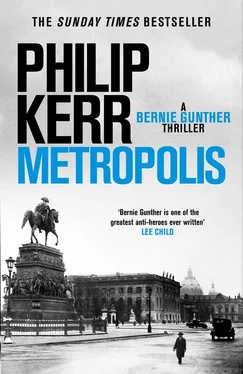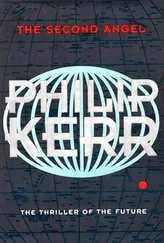Cursing, I shaved and washed, put on a clean shirt, and went to the Alex — my first day back in the Praesidium since my adventures with the klutz wagon — and immediately joined a meeting that had just begun in Weiss’s office, where Ernst Gennat was explaining his latest theory: that Dr Gnadenschuss was a member of the Stahlhelm because a Steel Helmet stickpin had been found in the latest victim’s hand.
I listened patiently until Gennat finished and then made my objections.
‘I’m afraid that Tetzel’s stickpin sounds suspiciously like a soft clue to me.’
‘A soft clue?’ said Weiss. ‘What the hell’s that?’
‘It was Ernst himself who thought Winnetou was deliberately planting soft clues like that to put us off the scent. Or onto the wrong one. Don’t you remember the Freemason cuff link that was found at the scene of Helen Strauch’s murder? And the British pound note we found next to Louise/Fritz Pabst? And the cigar holder next to Eva Angerstein’s corpse?’
‘Yes.’
‘A Steel Helmet stickpin fits the same pattern. An object for us to waste time on.’
‘Yes, but the stickpin would fit in with the Nazi profile of the killer that we’ve seen in his letters to the newspapers.’
‘Would it? I’m not so sure. Members of the Stahlhelm regard themselves as conservative nationalists, yes, but above politics and very separate from the Nazis. At least that’s my understanding.’
Gennat wasn’t about to give up on his theory without a struggle.
‘There must be plenty of those bastards who admire Adolf Hitler as much as they hate the Jews,’ he said. ‘Wouldn’t you agree? And unless you’ve had some luck finding Prussian Emil, it’s about all we’ve got to go on right now.’ He paused and lit a cigar. ‘Well, have you?’
I shook my head. I wasn’t ready to share what I’d learned from Emil nor the circumstances in which this information had been acquired. Not without some very hard evidence. I didn’t think any of my superiors — and certainly not the newspapers — were going to welcome the news that eight Berliners had all been murdered by a single cop in the city’s police department.
‘No, I thought not. Gunther, I want you to spend the rest of your day in the records department, looking for anyone with a conviction for violent assault who happens also to be a member of the Stahlhelm.’
‘I don’t know that something like that would be recorded,’ I said.
‘When arrested, a suspect is obliged to empty his pockets, isn’t he? A Stahlhelm membership card would be part of a man’s personal effects. You’ll find it listed there.’
‘It would probably be quicker,’ added Weiss helpfully, ‘to see what Commissar Dr Stumm has in that respect. And then to cross-check with Records. Wouldn’t you agree, Ernst?’
Commissar Dr Stumm was with the political police, created to forestall attacks by political agitators against the republic.
As it happened, some time in the records department suited me very well; the last place I wanted to be was at my desk manning the telephone. I needed somewhere quiet to think about what Prussian Emil had told me, and Records was as good as the public library in this respect.
‘Yes, probably,’ said Gennat. ‘Although as you know I’ve never been a fan of having a political police force in Germany. It smacks of spying on your own citizens. But however he does it, I think it will make a nice change for Gunther to carry out some good old-fashioned police work.’
I stayed late in Records before returning to my desk, having found nothing in the files of any consequence. Not that I’d expected to, and not that I’d tried all that hard.
I hadn’t been at my own desk for very long before the telephone rang. It was Erich Angerstein.
‘So what have you found out?’ he asked.
‘About a murderous cop? Nothing yet.’
‘I thought we narrowed it down quite nicely last night. From a population of four million Berliners to one crazy cop.’
‘You know, you ought to take a look at the number of cops there are in Berlin sometime. Oddly enough, even the sane ones are in plentiful supply. As a matter of fact, there are fourteen thousand uniformed police, three thousand detectives, three hundred cops in the political police and four thousand police administration officials. It’ll take me a while to sift them out and figure which one of them is a murderer, Erich. You’re going to have to be patient for a little longer.’
‘Not something I’m good at, Gunther. You should know that by now.’
‘And I told you that we were going to have to do this my way. I’ve spent the whole day going through criminal records looking for what’s called evidence.’
‘Find anything interesting?’
‘Look, I’m a detective at the Alex.’
‘You make that sound like it’s something respectable.’
‘At the Alex we take a bit of time making up our minds. We’re known for it. Justice requires that we do a little bit more than just pick a name out of a hat.’
‘I’m not in the Alex. I’m in a hurry. I want this bastard caught and punished. And I don’t much care about justice. At least not the way you understand it. Punishment — proper punishment — is what I care about. Retribution. You know, I checked out your friend in Wuhlgarten, the one who escaped the axe: Bruno Gerth. And it seems a lot of people thought he had police protection. Maybe I should speak to him. Maybe he has a disciple. These bastards often do.’
‘I’d be careful about trying to get in there. They might not let you out.’
‘They say you shouldn’t yell at a sleepwalker in case he falls and breaks his neck. But this is me yelling at you now, Gunther. Find this man. Find him soon. Otherwise, it’s your neck.’
He rang off, which was just as well, as I was on the verge of telling him to go to hell. But I was only thinking about it. With a man like Erich Angerstein it was as well to speak softly. I’d seen what he could do with a cane when he wasn’t even angry.
Heading home, I caught the double-decker bus west. I went upstairs and smoked a cigarette. I like riding on the upper deck; you see the city from a whole different angle up on top so that it almost seems unfamiliar. It was the very opposite of being on the klutz wagon. As we headed down Unter den Linden I glanced in at the Adlon and was thinking of Thea von Harbou when I saw some of the white-shoe types going in for dinner. Except that they weren’t white shoes but spats . And I suddenly remembered a cop who wore spats. One of the very few cops — apart from Weiss himself — who ever wore spats. Spats that might easily have looked like white shoes to a man like Stefan Rühle. It was about then I remembered the tune this same cop was fond of whistling: The Sorcerer’s Apprentice . The same cop who had a thick beard, fine clothes and a heavy walking stick that could have looked like a sceptre, I suppose, and who’d been on his way to an apothecary to get something for his red eye. Just as Rühle had described. The same cop who bitterly resented Bernhard Weiss. The same cop I’d always thought of as a good friend. Kurt Reichenbach .
Was it possible that he’d been about to shoot another disabled veteran, but had stopped when he realized that the vet was me? The more I thought about it, the more it seemed quite possible that instead of Reichenbach saving me from the wild boys outside Lehrter Bahnhof, it might have been they who’d saved me from him. The gun he’d lent me afterwards was still in my pocket. I took it out and looked at it now: a Browning .25-calibre automatic — the same kind of vest pocket gun that had killed all those men; lots of cops carried one as a spare, only this one might actually have been a murder weapon. Reichenbach was certainly arrogant enough to lend it to me all the same. And why not? Who would ever have suspected him of being Dr Gnadenschuss? He probably had another. He might have several. Reichenbach had never looked like a man who was short of anything, let alone a gun.
Читать дальше












